| Srl | Item |
| 1 |
ID:
154705
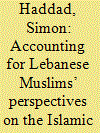

|
|
|
|
|
| Summary/Abstract |
This article seeks to determine the correlates of Lebanese Muslims perceptions of the Islamic State (ISIS) which are measured using the hypotheses that commitment to political Islam, young age, education and occupational status would predict approval of ISIS. In view of the accentuated polarisation between Sunnis and Shiis along sectarian lines, it is proposed that dislike for the Shiis would enhance the level of support for ISIS. The study was based on a cross-sectional survey Lebanese Muslims (N = 302) administered during the fall of 2015.The suggestion is that adherence to the tenets of political Islam, sectarianism and educational attainment are major predictors of endorsement for ISIS.
|
|
|
|
|
|
|
|
|
|
|
|
|
|
|
|
| 2 |
ID:
146562
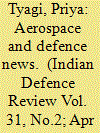

|
|
|
| 3 |
ID:
139123
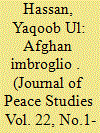

|
|
|
| 4 |
ID:
145451
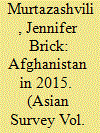

|
|
|
|
|
| Summary/Abstract |
Hopes for national unity and stability in Afghanistan were dashed in 2015 as the government lost control of significant territory to insurgents. Kunduz City fell briefly to the Taliban, the first major city to fall to them since 2001. The ANSF experienced heavy casualties, at a time when nearly one-fifth of the country’s districts were either controlled or heavily contested by the Taliban.
|
|
|
|
|
|
|
|
|
|
|
|
|
|
|
|
| 5 |
ID:
139661
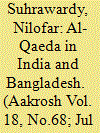

|
|
|
| 6 |
ID:
133849
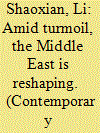

|
|
|
|
|
| Publication |
2014.
|
| Summary/Abstract |
Turmoil in Iraq reached a new level when ISIL seized Mosul after the Iraq security force collapsed on June 10. Although ISIL, the Islamic State in Iraq and the Levant , look after over Fallujah in early 2014, this latest development has deeper repercussions. On June 29, ISIL declared a large territory between Iraq and Syria a new state.
|
|
|
|
|
|
|
|
|
|
|
|
|
|
|
|
| 7 |
ID:
152051
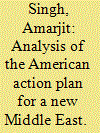

|
|
|
| 8 |
ID:
151378


|
|
|
| 9 |
ID:
143054
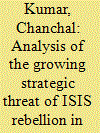

|
|
|
|
|
| Summary/Abstract |
Since June 2014, the extremist terrorist group known as the Islamic State of Iraq and the Levant (ISIL or ISIS) has expanded quickly and seized significant territory in Iraq and Syria. It not only threatens the very existence of the Iraqi government, but also has changed the nature of the Syria conflict, and its influence is spilling over outside of the region.
|
|
|
|
|
|
|
|
|
|
|
|
|
|
|
|
| 10 |
ID:
141335
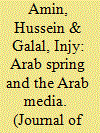

|
|
|
| 11 |
ID:
143059
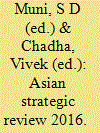

|
|
|
|
|
| Publication |
New Delhi, Pentagon Press, 2016.
|
| Description |
xiv, 380p.hbk
|
| Standard Number |
9788182748859
|
|
|
|
|
|
|
|
|
|
|
|
Copies: C:2/I:0,R:0,Q:0
Circulation
| Accession# | Call# | Current Location | Status | Policy | Location |
| 058437 | 355.005095/MUN 058437 | Main | On Shelf | General | |
| 058438 | 355.005095/MUN 058438 | Main | On Shelf | General | |
|
|
|
|
| 12 |
ID:
142936
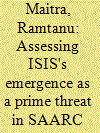

|
|
|
| 13 |
ID:
138611
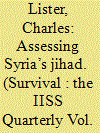

|
|
|
|
|
| Summary/Abstract |
The conflict in Syria has changed significantly since the first signs of an armed insurgency began to emerge in late May 2011. While the largely nationalistminded Free Syrian Army (FSA) gradually devolved into an amorphous gathering of locally focused militia units with minimal command links to a leadership in Turkey, the capabilities and influence of Salafist and Sunni
jihadist groups expanded considerably.
|
|
|
|
|
|
|
|
|
|
|
|
|
|
|
|
| 14 |
ID:
142937
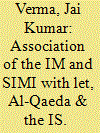

|
|
|
| 15 |
ID:
158219
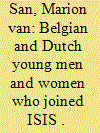

|
|
|
|
|
| Summary/Abstract |
Since the end of 2012 a sizeable number of Belgian and Dutch young men and women have joined the armed conflict in Syria. According to recent estimates, there are 632 Belgian and 260 Dutch foreign fighters in Syria. Very little is known about the families these men and women come from. The research on which this article is based comprised ethnographic research among 26 families with at least one member who has left for Syria to join the armed struggle. In addition, former teachers of these youngsters were asked to reflect on their students' actions. The central question of this article is whether or not the families of youngsters who left for Syria played a supporting role in the departure decision and, therefore, the process of radicalization of the young men and women. To answer this question the families' perception of the armed struggle is described. Also discussed are signals of radicalization present prior to the youngsters' departure and actions taken by the families to prevent departure or alternatively facilitate their trip.
|
|
|
|
|
|
|
|
|
|
|
|
|
|
|
|
| 16 |
ID:
143117
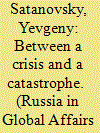

|
|
|
|
|
| Summary/Abstract |
The good thing about our world today is that the spread of information leaves little secret about history. To illustrate this I would like to remind our readers about the Anglo-Russian Convention signed in St. Petersburg in 1907, which left Tibet with China, put Afghanistan under British rule, and divided Iran between Britain and Russia, giving the latter control over the Caspian Sea. If the October Revolution of 1917 had not taken place, the Great Game would have been over. The Sublime Porte shrank enormously after World War I, Russia acquired new territories in Eastern Anatolia under the Sykes-Picot Agreement (a special provision gave Russia control over the Black Sea Straits), and the U.S. presence in the Middle East was barely noticeable, while Britain and France played a leading role in the region.
|
|
|
|
|
|
|
|
|
|
|
|
|
|
|
|
| 17 |
ID:
141545
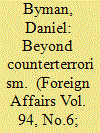

|
|
|
|
|
| Summary/Abstract |
When the Obama administration looks at the Middle East [2], it does so through the lens of counterterrorism. A systematic emphasis on the subject has underscored not just the administration’s relentless pursuit of al Qaeda and its new focus on the self-proclaimed Islamic State [3] (or ISIS) but also a wider swath of its foreign policy, from its drone campaign in northwestern Pakistan to its maintenance of the detention facility in Guantánamo Bay.
|
|
|
|
|
|
|
|
|
|
|
|
|
|
|
|
| 18 |
ID:
186861
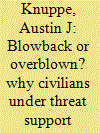

|
|
|
|
|
| Summary/Abstract |
How do military tactics shape civilian support for foreign intervention? Critics contend that invasive tactics undermine popular support by alienating the civilian population. Counterexamples suggest that civilians will support invasive tactics when foreign counterinsurgents are willing and able to mitigate a proximate threat. I reconcile these divergent findings by arguing that civilian support is a function of threat perception based on three interacting heuristics: social identity, combatant targeting, and territorial control. To evaluate my theory, I enumerate a survey among Iraqi residents in Baghdad during the anti-ISIS campaign. Respondents preferred more invasive tactics when foreign counterinsurgents assisted the most effective local members of the anti-ISIS coalition. Across sectarian divides, however, respondents uniformly opposed the deployment of foreign troops. These findings suggest that in regime-controlled communities, civilians will support counterinsurgents who are invasive enough to mitigate insurgent threats, but not too invasive as to undermine local autonomy.
|
|
|
|
|
|
|
|
|
|
|
|
|
|
|
|
| 19 |
ID:
147289
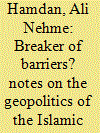

|
|
|
|
|
| Summary/Abstract |
In the last two years, the so-called “Islamic State in Iraq and Sham” has transformed the Syrian Civil War, effecting serious confrontations in Iraq and Lebanon, dismantling security regimes along the Iraq-Syria border, and causing the mass exodus of ethno-religious communities across the region. These dramatic events are often interpreted through the official rhetoric of the group itself, which draws on discourses of the “Sykes-Picot” conspiracy and narratives of returning to Islamic principles. Tempting though it is to deconstruct such rhetoric on its own, efforts in this direction have over-emphasised its Islamic and territorial elements to the detriment of a deeper understanding of the locally varying, strategic nature of ISIS’s activities in the Middle East. Accordingly, this paper considers how local interests articulate with ISIS’s transnational movement, looking at their activities along the border region of Syria, Iraq, and Turkey. It begins with a discourse analysis of one important narrative in early analysis of ISIS’s “border-breaking” rhetoric, the narrative of Sykes-Picot, before laying out how geographers have engaged with the geopolitics of radical Islamist militant groups more generally. Then drawing on a combination of secondary sources and ethnographic fieldwork in Turkey and Jordan, it elaborates how the politics of place shapes ISIS’s political practice, using the example of the Syrian-Iraqi borderland (the Jazirah). In doing so, I hope to emphasise the relative importance of historical-geographic context over discourse and narrative for understanding the actions of ISIS.
|
|
|
|
|
|
|
|
|
|
|
|
|
|
|
|
| 20 |
ID:
138622


|
|
|
|
|
| Summary/Abstract |
IF STRATEGY is the art of rethinking the possible, then the time for strategic innovation against what the U.S. military terms violent extremist organizations (VEOs) is now. The American-led air war in Iraq and Syria may have shown some progress against the Islamic State and other VEOs, but the VEOs and their sympathizers have hit back with attacks in France and brutal beheadings of journalists and aid workers. Frustration is growing in Congress as the traditional tools of American power fail to produce decisive results. But what can those on Capitol Hill do?
|
|
|
|
|
|
|
|
|
|
|
|
|
|
|
|